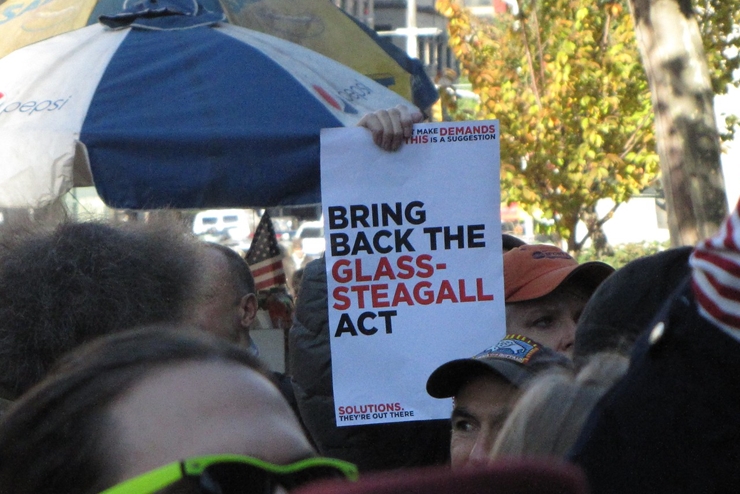President Donald Trump has lost ground in the arena that gave him a victory four years ago: Main Street. Recent headlines are not shy in proclaiming this. But he can win Main Street back if he would commit to reining in Wall Street. A commitment to separate commercial and investment banking through a reinstated Glass-Steagall Act would assure small-business owners that the president is on their side.
Trump, and other 2020 candidates, should start campaigning on restoring Glass-Steagall and taking other measures to curb Wall Street excesses. In addition to the beneficial economic effects, the reinstatement of Glass-Steagall might have a nice countervailing-power effect on “woke” corporations, to the enormous benefit of American liberty.
The Glass-Steagall Act had separated commercial and investment banking until it was abolished under President Bill Clinton’s signature. Neoliberals regard Glass-Steagall as anathema, which is why the 2020 Democratic Party platform’s genuflection to it is an empty gesture, and will be for at least as long as the arch-neoliberal Joe Biden is at the party’s helm.
Biden is, and always has been, a good friend of Wall Street. The finance industry’s gargantuan donations to his presidential campaign underscore this fact. Good old Joe is an unwavering neoliberal, along the lines of Lawrence Summers and Robert Rubin, the Bill Clinton economic advisors who urged Glass-Steagall’s overthrow, and thus it’s not realistic to expect him to be serious about reinstating it.
Bernie Sanders knows this all too well. Could Sanders say to his populist supporters, with a straight face, that a President Biden will do right by Main Street even if it means making Wall Street howl? Certainly not. Sanders’ support for Biden must therefore be taken with a grain of salt.
Since Glass-Steagall was abolished, Wall Street and America’s billionaires have vastly increased their wealth and power. After the historic 2008 crash, Wall Street emerged even more “Too Big to Fail,” thanks to the efforts of President Obama’s Treasury secretary, Timothy Geithner, who was Rubin’s disciple.
Main Street does not fundamentally depend on any lifeline from Wall Street, but it does fundamentally depend on the willingness of Wall Street to renounce self-dealing. Unfortunately, Wall Street will almost never renounce self-dealing until Congress forces it to. When Wall Street has free reign to engage in self-dealing, as it inevitably does when commercial and investment banking are not separated, Main Street suffers. Which is to say, ordinary Americans end up holding the short end of the stick.
Right now, Trump is paying the price of leading his first term with tax cuts instead of an infrastructure bill that would have galvanized Main Street. It’s not his style to apologize. But he can promise to fix it. And one way to do that is to campaign vigorously on Wall Street regulation from here to election day.
In doing so, he will reinforce his outsider status and make clear that he is, at bottom, no neoliberal. Not only will this hearten many ordinary Americans who are now on the fence in Wisconsin and Michigan and elsewhere, but it may well encourage many Bernie Sanders supporters to sit this one out or write in Kanye West’s name. Which reminds me: Yo, Kanye! Why don’t you call for reinstating Glass-Steagall?
But it’s not only the economy, and the prosperity of ordinary Americans, that would be transformed by reining in Wall Street. The culture would also benefit. Specifically, “woke” corporations that have been donating funds and lip service to radical causes would be suddenly aware of the new Damoclean sword hanging over their heads. If a second-term Trump can check Wall Street’s privilege, he can do the same to corporate America generally.
For starters, a new Glass-Steagall could pave the way for a renewed antitrust law. For that matter, why not update the laws for corporate charters, perhaps to prevent political meddling and encourage more responsible behavior? Thoroughgoing reforms of American capitalism could be possible, if Trump demonstrates the will.
Urging Congress to pass legislation reinstating Glass-Steagall should be a no-brainer for Trump. Although there is reason to think there are plenty more “shy voters” now than there were in 2016, there may not be enough shy voters out there, hidden in the interstices of American politics, to close Trump’s current polling gap further.
So, why take the risk, Mr. President? Burnish your credentials as an economic populist, and demand that commercial banking and investment banking once again be separated. Stand up squarely for a long beleaguered Main Street, before it’s too late.
Image Credit:
above: Occupy Wall Street sign [Image by: Scott Teresi / CC 2.0 via flickr, cropped and resized]

Leave a Reply